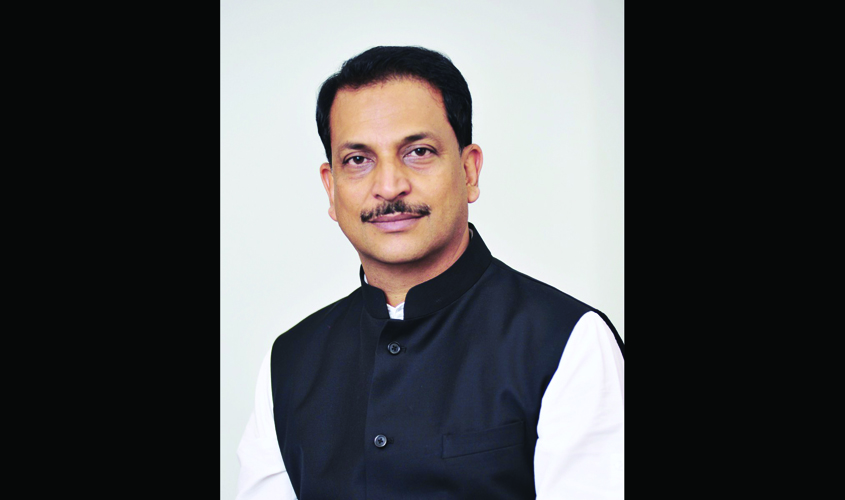Q: What is the status of the Skill India campaign launched by the Ministry of Skill Development and Entrepreneurship (MSDE) in 2015 with the purpose of making India the “skill capital” of the world? Are you satisfied with the achievements so far?
A: The Skill India campaign launched and propagated by the MSDE is steadfast on its mission to reap the demographic dividend the country currently has. Skills have formally been recognised now with the inception of Skill India programme. It has missed its due importance for the last 70 years. For the first time ever, a ministry has been formed to ensure one robust ecosystem, which has outcome-based skill courses that are certain to contribute to the country’s economic growth.
The Centre has allocated more than Rs 12,000 crore to the Pradhan Mantri Kaushal Vikas Yojana (PMKVY), to provide skill training avenues to the youth, who cannot afford to pay for their trainings and mobilise them to undertake industry relevant skills. The number of skill training centres has seen a 499% increase, growing from 1,736 to 8,662 over a span of three years.
Our ITI ecosystem of more than 13,000 institutes has been re-energised, upgraded and modernised with 44% increase in its number of seats, leading to a better skilling environment. We have brought about academic equivalence to Classes 10 and 12 for our ITI students in conjunction with the National Institute of Open Schooling. We are also promoting young entrepreneurs and self sustainability through our recently announced Pradhan Mantri Yuva Yojna, which aims to cover 14.5 lakh candidates over the next five years.
MSDE has also partnered with 11 countries to ensure global mobility in jobs. The Skill India Mission has seen great synergies and we have been able to train more than 1.17 crore candidates under our own programmes, alone.
Q: Unemployment continues to be a major concern for the people of India. How do you plan to address this issue through your ministry?
A: With government initiatives like “Make in India”, “Digital India”, “Smart Cities” and “Start up India”, there are several opportunities for employment for the youth. With the advent of technology, if skills are upgraded and new age skills are adapted to, there is considerable scope for job opportunities in both domestic and global markets. People who have multi-skills today are preferred by industries. A guard today doubles up for a security professional as well.
Q: How many people have been skilled in the last two years and how many of them have got employment so far?
A: More than 1.17 crore people have been skilled under the various programmes under the Skill India Mission till now. More than 28 lakh candidates have been trained under Pradhan Mantri Kaushal Vikas Yojana and another 38 lakh candidates through our ITI ecosystem. As many as 4.62 lakh people were trained under the Recognition for Prior Learning (RPL) programme, where the individuals are given recognition for the skills that they have acquired over the years through on-field training or family legacy. Under our recently introduced National Apprenticeship Promotion Scheme (NAPS), we have more than 6 lakh candidates engaged by the industry. Placement is not a mandate for the Ministry, but there are multiple initiatives that we have taken to ensure linkages to job, whether it is through Rozgar Melas (job fairs) or through shop floor trainings through apprenticeship training.
Q: Which trades/skills come under the purview of Skill India campaign? Do you propose to increase the number of skills in future?
A: There are prominent sectors like textiles, beauty and wellness, automotive, retail, hospitality, IT, financial sector, aviation, construction, healthcare, agriculture, food processing, furniture and furnishings and even niche ones like strategic manufacturing, domestic help, gems and jewellery, robotics and mechatronics. Depending on the industry requirements, we will see if we have to include more job roles under our skills framework.
Q: There was a plan to open skill centres all over the country. How many centres have been set up so far? What is the plan for the future?
A: Our plan is to set up multiple PMKVY multi-skilling centres across all states, at least one in each district. Currently, there are 251 PMKKs, which are fully operational, and which will be increased to 556 soon across 514 districts in the country. We have 5 DTIs already set up in the pilot phase and we intend to set up 50 more DTIs by the end of 2017. There are 16 India International Skill Centres (IISCs) and by the end of 2017 we plan to launch 100 total such centres. We further are in process of upgrading 4 ATIs into high end skill development institutes modelled after ITE Singapore.
Q: Are you finding it difficult to get trainers for conducting skill related courses? If yes, how do you propose to overcome this problem?
A: There is certainly a huge demand for trainers in the skill ecosystem, but we have recently taken initiatives where we have partnered with the ex-servicemen in our armed forces across Army, Navy and Air Force, where we are engaging with them and training them to become trainers in the ecosystem. We have even partnered with CRPF and CISF, recently. Their discipline, experience and expertise will give us the best of trainers in our ecosystem.

